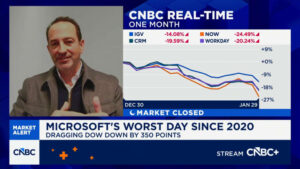April is National Financial Literacy Month. To mark the occasion, MarketWatch will publish a series of “Financial Fitness” articles to help readers improve their fiscal health, and offer advice on how to save, invest and spend their money wisely. Read more here.
Do you know the difference between a stock and a bond, or a mutual fund and an exchange-traded fund? MarketWatch put together a meat and potatoes — although that’s always relative — quiz for our savvy readers. We’ve stuck to some familiar topics — taxes, stocks, interest rates, savings and inflation. There are 10 questions — with one bonus question thrown in for good measure.
You don’t know what you don’t know until you get an incorrect answer in a financial literacy quiz. Some of the questions are tricky, but we hope they are fun and that — most importantly — readers learn something new. Financial literacy helps us to plan for the future, gives us peace of mind and brings more understanding and less fear about the complex world of investing and retirement.
Our aim is to raise awareness of Financial Literacy Month. If you get 10/10, including the bonus question, buy yourself (and a friend) a popsicle. If you didn’t answer all the questions correctly, buy yourself a popsicle anyway. We, at MarketWatch, aim to democratize and demystify financial news, and make this sometimes intimidating subject as accessible as possible.
If you found it useful and/or entertaining, share it with a friend.
–Quentin Fottrell
Question 1: What is the difference between a tax deduction and a tax credit?
(a) A tax deduction reduces your income taxes directly. A tax credit reduces your taxable income.
(b) A tax deduction reduces your taxable income. A tax credit reduces your income taxes directly.
(c) Both reduce your income taxes directly.
Question 2: Which way do bond prices move when interest rates rise?
(a) Bond-market prices fall as interest rates rise. Bond prices rise when interest rates decline.
(b) Bond-market prices rise as interest rates rise. Bond prices fall when interest rates decline.
(c) Bond-market prices fall as interest rates rise, but bond prices also fall when interest rates decline.
Question 3: What has been the average annual total return, with dividends reinvested, for the S&P 500 over the past 30 years?
(a) 9.7%, according to FactSet.
(b) 3%, according to FactSet.
(c) 6.5%, according to FactSet.
Question 4: What is compound interest and how does it work?
(a) Compound interest reflects the linear gain that comes from all the reinvested interest of your savings and investments, which allows your initial investment/deposit to gain value regardless of the amount of interest you pay.
(b) Compound interest reflects the exponential gain that comes from all the reinvested interest of your savings and investments, which allows your initial investment/deposit and the additional to interest increase in value.
(c) Compound interest reflects the amount of interest you pay every month on a loan, and the total amount of interest you have paid over the lifetime of that loan.
Question 5: What is APR and how is it different from a regular interest rate?
(a) APR is the annual interest on a loan calculated on the initial loan, including additional costs and fees, but not on the accumulated interest incurred on the loan.
(b) APR is the annual interest on a loan calculated on the initial loan and the accumulated interest over the entire lifetime of the loan.
(c) APR is the annual interest on a loan calculated on the initial loan, including additional costs and fees, and the accumulated interest in the first year of the loan.
Question 6: What percentage of your income should you spend on rent?
(a) Most real-estate experts say you should spend no more than 20% of their income on housing costs, which is considered to be a tipping point for becoming “cost-burdened.”
(b) Most real-estate experts say you should spend no more than 50% of their income on housing costs, which is considered to be a tipping point for becoming “cost-burdened.”
(c) Most real-estate experts say you should spend no more than 30% of their income on housing costs, which is considered to be a tipping point for becoming “cost-burdened.”
Question 7: What’s an ETF?
(a) ETFs are Exchange-Traded Funds, are a basket of investments — stocks, bonds, or commodities — that investors can buy throughout the trading day like stocks.
(b) ETFs are Exchange-Traded Funds, are a basket of investments — stocks, bonds, or commodities — that investors can only buy at the end of the trading day.
(c) ETFs are Exchange-Titled Funds, are a basket of investments — stocks, bonds, or commodities — that investors can only buy during or at the end of the trading day.
Question 8: What is the difference between a stock and a bond?
(a) A stock is a temporary investment in a company, while a bond is issued by a company to reward shareholders.
(b) A stock is a share in the ownership of a company, while a bond is issued by a company to finance a loan.
(c) A stock is a share in the ownership of a company, while a bond is issued by a company to finance the stock.
Question 9: If you were born in 1960 or later, at what age can you receive your full Social Security in the U.S.? Bonus question: At what age can you receive your maximum Social Security benefit?
(a) Full retirement age in the U.S. is 65 for those born in 1960 and after. While you can start collecting your Social Security retirement benefits as early as 62, your benefits are permanently reduced. Your Social Security benefits max out at age 70. By delaying until 70, your benefit is 76% higher than if you had claimed at the earliest possible age (62).
(b) Full retirement age in the U.S. is 65 for those born in 1960 and after. While you can start collecting your Social Security retirement benefits as early as 62, your benefits are permanently reduced. Your Social Security benefits max out at age 67. By delaying until 67, your benefit is 76% higher than if you had claimed at the earliest possible age (62).
(c) Full retirement age in the U.S. is 67 for those born in 1960 and after. While you can start collecting your Social Security retirement benefits as early as 62, your benefits are permanently reduced by a small percentage each month until you reach 67. Your Social Security benefits max out at age 70. By delaying until 70, your benefit is 76% higher than if you had claimed at the earliest possible age (62).
Question 10: What is the Fed’s desired rate of inflation?
(a) 2%
(b) 3%
(c) 2.5%
Bonus question! What is considered a good credit score?
(a) 560
(b) 680
(c) 800
If you get 10/10, including the bonus question, buy yourself a popsicle.
Getty Images/iStockphoto
Answer 1:
(b) A tax deduction reduces your taxable income. A tax credit reduces your income taxes directly.
Answer 2:
(a) Bond-market prices fall as interest rates rise. Bond prices rise when interest rates decline.
Answer 3:
(a) 9.7%, according to FactSet.
Answer 4:
(b) Compound interest reflects the exponential gain that comes from all the reinvested interest of your savings and investments, which allows your initial investment/deposit and the additional interest to increase in value.
Answer 5:
(c) APR is the annual interest on a loan calculated on the initial loan, including additional costs and fees, and the accumulated interest over the lifetime of the loan thus far.
Answer 6:
(c) Most real-estate experts say you should spend no more than 30% of your income on housing, which is considered to be a tipping point for becoming “cost-burdened.”
Answer 7:
(a) ETFs are Exchange-Traded Funds. These are baskets of investments — stocks, bonds, or commodities — that investors can buy or sell throughout the trading day.
Answer 8:
(b) A stock is a share in the ownership of a company, while a bond is issued by a company to finance a loan.
Answer 9:
(c) Full retirement age in the U.S. is 67 for those born in 1960 and after. While you can start collecting your Social Security retirement benefits as early as 62, your benefits are permanently reduced. Your Social Security benefits max out at age 70. By delaying until 70, your benefit is 76% higher than if you had claimed at the earliest possible age (62).
Answer 10:
(a) 2%
Answer for bonus question!
(b) 680. Although credit scores vary depending on the model, according to Experian, credit scores between 580 and 669 are considered “fair,” scores between 670 and 739 are regarded as “good”; 740 to 799 are considered “very good”; and scores of 800 and above are considered “excellent.”
This post was originally published on Market Watch






